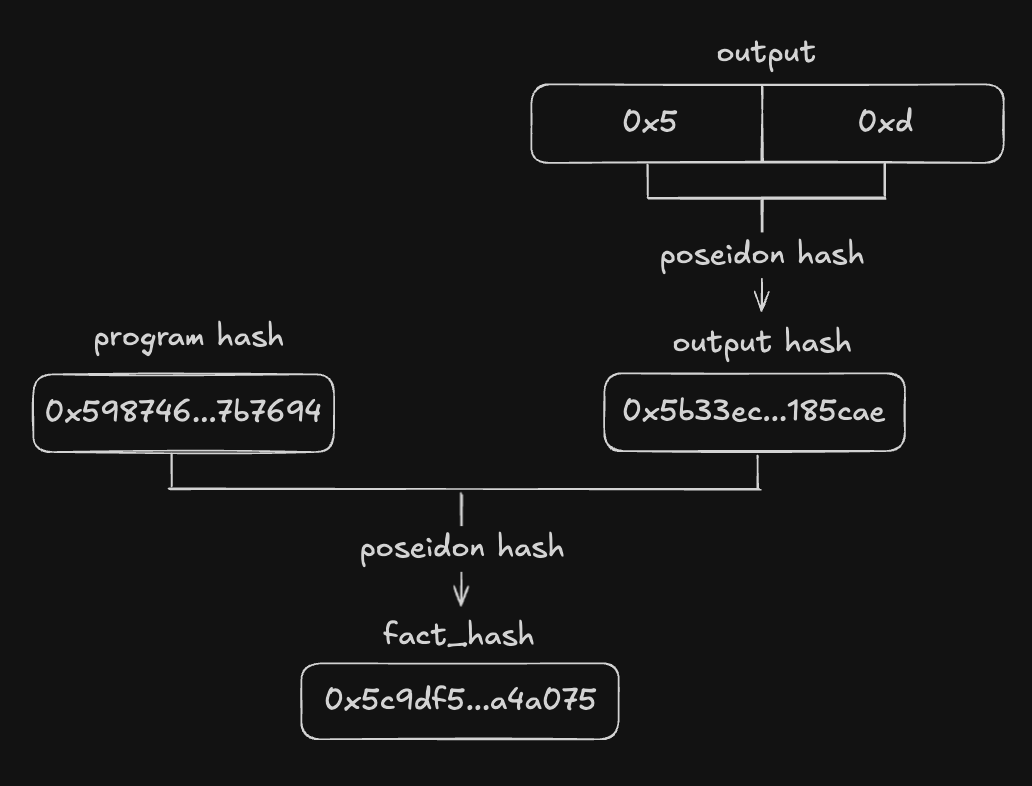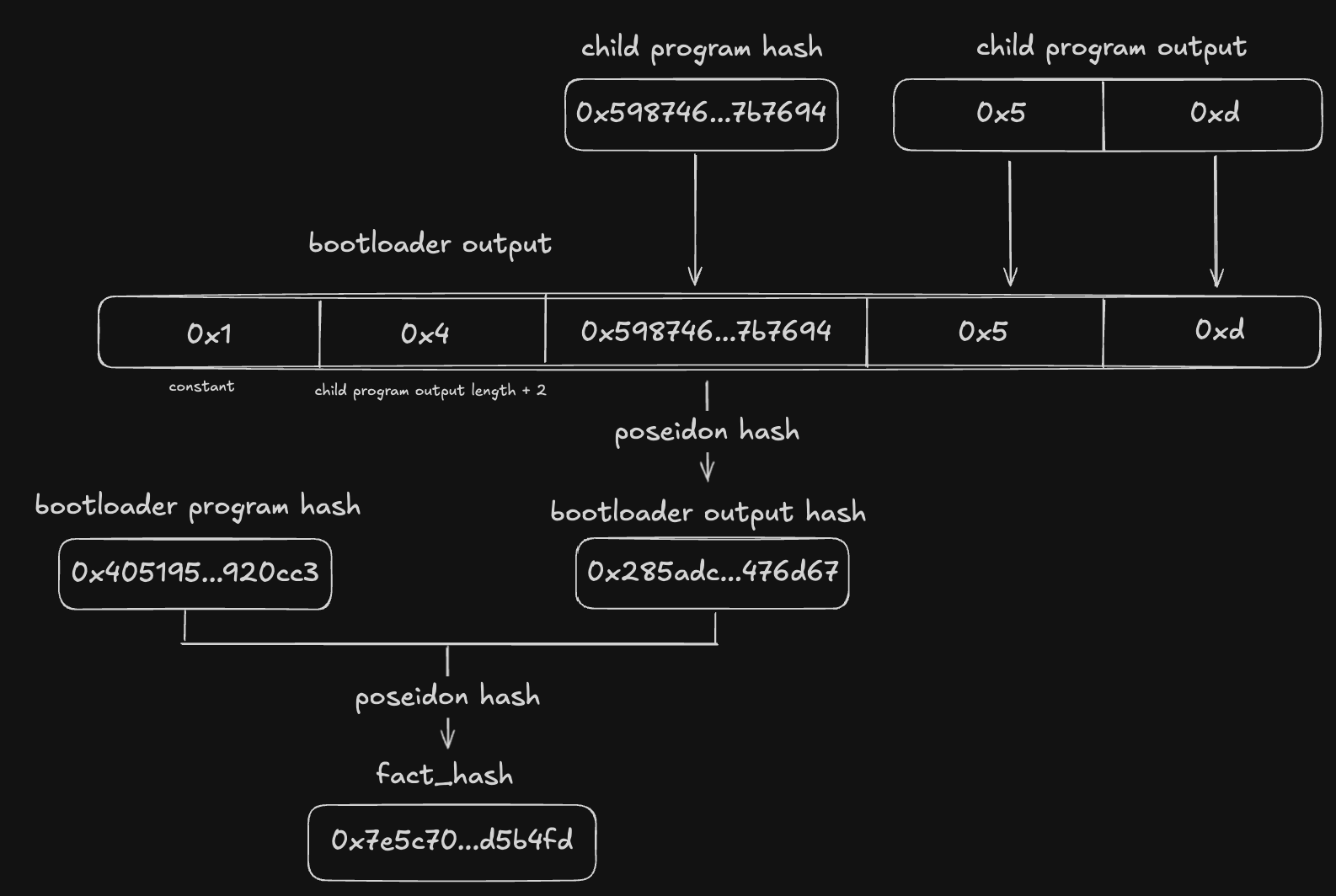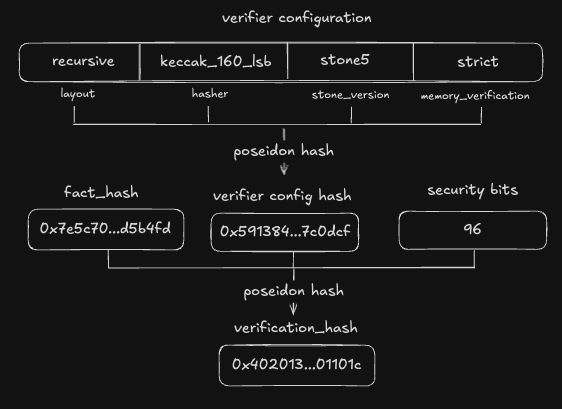use cairo_vm::program_hash::compute_program_hash_chain;
use cairo_vm::vm::runners::cairo_pie::CairoPie;
use starknet::core::types::Felt;
use starknet_os::crypto::poseidon::poseidon_hash_many_bytes;
use alloy::primitives::B256;
use cairo_vm::Felt252;
/// Default bootloader program version.
///
/// https://github.com/starkware-libs/cairo-lang/blob/efa9648f57568aad8f8a13fbf027d2de7c63c2c0/src/starkware/cairo/bootloaders/hash_program.py#L11
pub const BOOTLOADER_VERSION: usize = 0;
pub struct BootLoaderOutput {
pub one_felt: Felt,
pub program_output_len_add_2: Felt,
pub program_hash: Felt,
pub program_output: Vec<Felt>,
}
impl BootLoaderOutput {
pub fn to_byte_nested_vec(&self) -> Vec<Vec<u8>> {
let mut result = Vec::new();
result.push(self.one_felt.to_bytes_be().to_vec());
result.push(self.program_output_len_add_2.to_bytes_be().to_vec());
result.push(self.program_hash.to_bytes_be().to_vec());
for felt in &self.program_output {
result.push(felt.to_bytes_be().to_vec());
}
result
}
}
pub fn get_fact_l2(cairo_pie: &CairoPie, program_hash: Option<Felt>) -> color_eyre::Result<B256> {
let program_hash = match program_hash {
Some(hash) => hash,
None => Felt::from_bytes_be(
&compute_program_hash_chain(&cairo_pie.metadata.program, BOOTLOADER_VERSION)
.map_err(|e| {
tracing::error!(
log_type = "FactInfo",
category = "fact_info",
function_type = "get_fact_info",
"Failed to compute program hash: {}",
e
);
FactError::ProgramHashCompute(e.to_string())
})?
.to_bytes_be(),
),
};
let program_output = get_program_output(cairo_pie)?;
let boot_loader_output: BootLoaderOutput = BootLoaderOutput {
one_felt: Felt::ONE,
program_output_len_add_2: Felt::from(program_output.len()).add(2),
program_hash,
program_output,
};
let boot_loader_output_slice_vec = boot_loader_output.to_byte_nested_vec();
let boot_loader_output_hash_vec =
poseidon_hash_many_bytes(&*boot_loader_output_slice_vec.iter().map(|v| v.as_slice()).collect::<Vec<_>>())?
.to_vec();
let boot_loader_output_hash = boot_loader_output_hash_vec.as_slice();
// Bootloader Program Hash : 0x5ab580b04e3532b6b18f81cfa654a05e29dd8e2352d88df1e765a84072db07
// taken from the code sent by integrity team.
let boot_loader_program_hash_bytes = Felt::from_str("0x5ab580b04e3532b6b18f81cfa654a05e29dd8e2352d88df1e765a84072db07")?.to_bytes_be();
let boot_loader_program_hash = boot_loader_program_hash_bytes.as_slice();
let fact_hash = poseidon_hash_many_bytes(vec![boot_loader_program_hash, boot_loader_output_hash].as_slice())?;
Ok(B256::from_slice(fact_hash.to_vec().as_slice()))
}
pub fn get_program_output(cairo_pie: &CairoPie) -> Result<Vec<Felt252>, FactError> {
let segment_info =
cairo_pie.metadata.builtin_segments.get(&BuiltinName::output).ok_or(FactError::OutputBuiltinNoSegmentInfo)?;
let mut output = vec![Felt252::from(0); segment_info.size];
let mut insertion_count = 0;
let cairo_program_memory = &cairo_pie.memory.0;
for ((index, offset), value) in cairo_program_memory.iter() {
if *index == segment_info.index as usize {
match value {
MaybeRelocatable::Int(felt) => {
output[*offset] = *felt;
insertion_count += 1;
}
MaybeRelocatable::RelocatableValue(_) => {
return Err(FactError::OutputSegmentUnexpectedRelocatable(*offset));
}
}
}
}
if insertion_count != segment_info.size {
return Err(FactError::InvalidSegment);
}
Ok(output)
}




